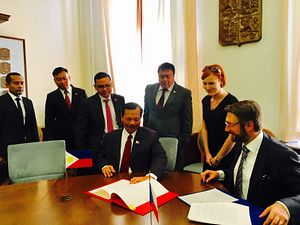Last week, the Philippines inked a new defense pact with the Czech Republic. The agreement illustrates both Prague’s interest in expanding into new markets as well as the diverse range of partners that Manila is exploring defense ties with amid the recent alignment shifts the country is experiencing under Philippine President Rodrigo Duterte.
The Czech Republic has not been a traditional defense partner for the Philippines. But the two sides have have mulled boosting their defense ties in the past, and have held discussions on equipment that Prague could provide Manila to boost its defense capabilities.
And as I have pointed out before, while Manila has tended to rely primarily on its treaty ally the United States for most of its defense needs, Philippine President Rodrigo Duterte’s pursuit of an independent foreign policy since coming to power last June – which so far has meant relatively less dependence on Washington and more diversification with players like China and Russia – has theoretically left the door open for other new partners (See: “The Limits of Duterte’s China-US Rebalance”).
On May 29, Philippine Undersecretary of Defense Ricardo A. David Jr. and Czech Deputy Minister Jacob Landovsky, the head of the Defense Policy and Strategy Division, inked the Defense Cooperation Agreement (DCA) at the defense ministry in Prague.
According to a press release issued by the Philippine Department of Foreign Affairs, the agreement both paves the way for cooperation in the field of defense and security as well as institutionalizes it with the establishment of a Joint Defense Committee to organize “concrete cooperation activities.”
While the DCA might provide a good foundational structure for a defense relationship, it is not yet clear what meat might be placed on these bones. The press release itself was rather vague on what these “concrete cooperation activities” would entail, providing a laundry list of potential areas of cooperation which included “defense and security policy, procurement policy, defense logistics, peacekeeping and humanitarian operations, compliance with international treaties of defense, security and arms control, personnel management, military training and education, and other activities that may be agreed by both Parties.”
The Czech ambassador to the Philippines, Jaroslav Olša, Jr., was vaguer still on the significance of the pact and what it meant for the future of the defense relationship more specifically. He was reported as saying by Philippine media outlets that the deepened relationship illustrated “not only…our aim to promote peace and security for the people and our land, but more importantly, the valued and shared causes and understandings that we aim to adhere by.”
Both countries have held more specific discussions previously, including on kinds of equipment that Prague can provide Manila from small arms to planes. Whether or not the agreement will translate into such tangible cooperation eventually, however, remains to be seen.

































